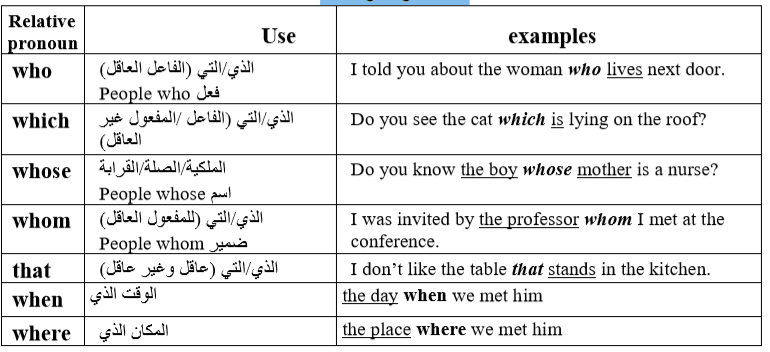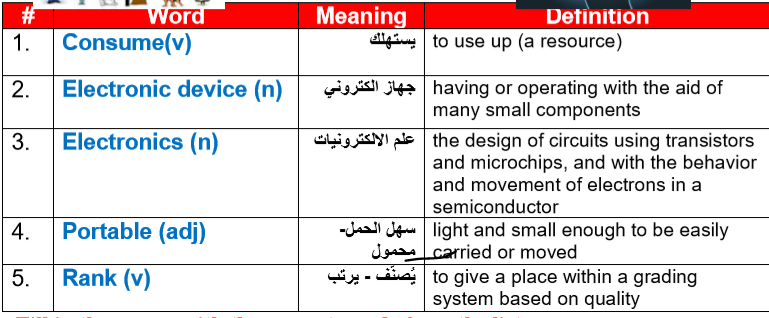مذكرة انجليزي حادي عشر ف2 #أ. محمد السيد 2021 2022
Grammar
Relative Pronouns: who / which / whose / when / where / whom
ضمائر الوصل

when (= on which) - where (= in which)
Do you remember the day when (= on which) we went to the café?
This is the school where (= in which) I study.
- Choose the most suitable answer from a, b, c and d:
1- The car,... ..........I bought last month, is very expensive.
a) who b) whose c) which d) where
3- I remember the time....... ...I travelled abroad for the first time.
a) where b) whose c) when d) who
4- Our neighbor, .............dog is always barking, visited us yesterday.
a) whose b) which c) where d) when
5- The place,........we will meet, is a very nice one.
a) who b) when c) whose d) where
Prefixes
Prefixes are attached to the beginning of a word to make a new word.
Redo (do again)
Unhappy (not happy)
Incomplete (not complete)
Television = tele + visualize
Teletext Telecommunication | Telephone Teleprint | Telefax

- Fill in the spaces with the correct words from the list:
(consume / electronics / portable / rank / electronic devices)
1. .......................... are very common as a kind of modernity in our life
2. Our high living standards cause our population to.......... 25% of the world's oil.
3. Advances in .................. mean that the technology is already available.
4. 2012 must ...................as the most difficult year for Europe since the 30s.
5. The laptop's ultra compact design makes it extremely.............and practical.
Set Book
1. How do you think the Internet has affected our consumption of radio and TV?
2. "Radio is the theatre of the mind "Do you agree? Why? Why not?
Translate the following into good English:
أحمد : يعد الراديو مسرحا للعقل، حيث أنه يزودنا بأحدث المعلومات والأخبار
خالد : نعم بالطبع، على الرغم من أنه إخترع قديم إلا أنه يستخدم طوال الوقت.
Ahmed:
………………………………………………………..……………………………………………..
………………………………………………………..……………………………………………..
Khaled:
………………………………………………………..……………………………………………..
………………………………………………………..…………………………………………….
WRITING
Useful Words and Phrases:
Phrases to Illustrate a Point or Introduce an Example:
For instance, for example, specifically, in particular, namely, such as, like, thus as an example, in the instance of, in other words, to illustrate
Phrases to Make Suggestions:
To this end, keeping this in mind, for this purpose, therefore
Phrases to Make Transition Between Information:
Also, furthermore, additionally, besides that, equally as important, similarly, lil as a result, otherwise, however, firstly, secondly, finally
Phrases to Contrast Points:
On the other hand, nevertheless, despite, in spite of, yet, conversely, instead, by same token
Phrases for Conclusions and Summarizing:
With this in mind, as a result of, because of this, for this reason, so, due to, sine finally, in short, in conclusion
• ... I'm sure that you can see that
• ...What needs to be done is
.../what we need to do is
• ...I ask you to think about
...I am writing in order to
• ...Nevertheless,
...On the other hand
• ...It has come to my attention that
• ...If you move forward with
• ...Obviously
• ...Surely
READING COMPREHENSION
Read the following passage carefully, then answer the questions that follow:
The Internet has become an important part of our modern lives. In fact, it is impossible for many people to imagine a day without some contact with the Internet. Most people use the Internet to shop, send e-mails, and for social networking. However, some people find it hard to control how much time they spend online
So, how much Internet is too much Internet? Experts and researchers agree that people who use the Internet so much that it causes problems with their daily activities are spending too much time online. Signs of Internet addiction include spending more and more time online, reducing or giving up social, work-related, or hobby-related activities in favour of spending time online, and giving up sleep to spend time on the Internet.
Experts say that this becomes a real problem when a person starts experiencing problems in sleeping, problems in their home and work life, and problems in having good social relationships. People who use the Internet excessively also seem to be more likely to show signs of depression. How do you know if you are spending too much time online? Some common warning signs include checking your e-mail every few minutes, always thinking about your next online session, and getting complaints from the people around you about how much time you spend online.
Showing any of these signs may mean that you are on your way to becoming addicted to the Internet. However, experts agree that there is hope. They say that simply understanding that spending too much time online is a problem may be the first step to solving the problem. They believe that, in most cases, doing something as simple as creating a better system for managing your time online can solve it. Getting a hobby that doesn't involve the Internet or any electronics is something they propose. A final suggestion is to have more relationships in real life.
The Internet is a wonderful tool for communicating and finding information. However, as with most things in life, you have to learn to use it carefully, and make sure you keep a healthy balance between it and the other important things .
A) From a, b, c or d, choose the correct answer:
1. What is the best title for this passage?
a. Internet Usage b. Internet Addiction c. Internet Problems d. Internet Communication
2. The underlined word “excessively” in the 3rd paragraph is closest in meaning to:
a. lightly b. scarcely c. massively d. gradually
3. The underlined word “their” in the 2nd paragraph refers to
: a. experts b. people c. problems d. researches 4
4. According to paragraph 3, one of the following is not mentioned as a sign of addiction.
a. Experiencing signs of depression. b. Experiencing problems in sleeping. c. Experiencing problems in work life. d. Experiencing having good social relationships

